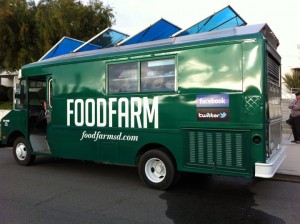The idea of farm to food truck isn’t a new concept to the mobile food industry, but at the same time, it is a term that some food truck owners aren’t aware of. This is a concept of purchasing locally grown food directly from the source.
The term which was adapted from “farm to table” comes from the idea that with less time and fewer hands for the food to get from the farm to the food truck, the fresher, more environmentally sensitive and community minded it is. This can include growing your own garden for sustainable consumption at home or for your mobile food business.
Benefits From The Farm to Food Truck Concept
Outside of the fact that you can greatly impact the economy of your community, health of your customers as well as the bottom line of your food cost budget as a result of buying from a local farm as your main food supplier.
- Support the local economy. Money stays within your community, which in turn directly supports your food truck business. Advertise the information about the farm that grows your food. Engage your customers with your locally-minded concept and inspire your neighbors to support local commerce as well.
- Keep inventory longer. Food that is purchased directly from the farm will naturally last longer on your storage shelves. It hasn’t spent time in a processing plant or on a delivery truck during the shipping process. It came straight from the ground to you, meaning you just bought yourself more time to think creatively.
- Invest in value. Many local farmers will compete with nationally recognized grocery store chains, but at times may charge a bit more because the quality of product that is being sold may be greater. Local produce and meat is more likely to be organic which increases the value of your menu.
- Create a local partnership. Building a business partnership between your business and local farmers, and other food trucks that support local business, can create a marketing network that promotes and sustains the local economy. Direct relationships with local farmers can lead to better communication, understanding of food sourcing, and potentially more favorable purchasing terms or access to unique ingredients.
- Environmental Sustainability: Farm-to-table sourcing typically involves less transportation, which can reduce carbon emissions associated with long-distance food shipping. Additionally, local farms are more likely to use sustainable farming practices, further reducing the environmental impact.

FoodFarm Food Truck from San Diego, CA
Challenges of Farm to Food Trucking
Sourcing farm-to-table products for food truck vendors involves buying ingredients directly from local farms, which can bring fresh and organic options to the menu. However, I know from experience owning my own food truck that this approach comes with its own set of challenges.
- Higher Food Costs: Farm-to-table ingredients often cost more than those bought from large suppliers or wholesalers. Small local farms typically have higher production costs because they use sustainable farming practices and do not produce food in bulk. As a result, the price for these higher-quality ingredients is higher.
- Buying meat locally. Buying locally raised and processed meat, fish and poultry can be challenging. The U.S. Department of Agriculture restricts the number of birds a farmer can process on site and does not allow any red meat processing for small farm operations. Because of this, the meat may have been locally and organically raised with an emphasis on humane standards, but the slaughter and processing of the meat animals are probably (with the exception of poultry) handled off site. You find more sustainable shopping tips for food truck owners about buying meats and supporting farmers markets.
- Finding off-season produce. There will be periods between planting and harvesting when produce may not be as bountiful. However, many farmers do have greenhouses where produce can be grown during colder months. Discuss off-season options with your partnered farmer or farmers ahead of time to avoid lack luster deliveries.
- Setting-up in the city. Maybe there isn’t a farm just down the road from where your food truck operates. This is the case for many mobile food businesses, but chances are there is a farm within a reasonable enough distance to your urban area. Visit your local farmer’s market and inquire about locations. Learn about delivery options for your establishment, or show up early and stock up weekly at the market.
- Limited Supply: Small farms might not be able to provide large quantities of produce, making it difficult for food trucks to get enough supply to meet their demand, especially if the food truck becomes very popular.
- Logistics and Transportation: Buying directly from multiple small farms requires managing several relationships and possibly dealing with different delivery schedules. This can add complexity to the food truck’s operations and increase costs for transportation and logistics. In the early days of my truck, I tried to source meat from one vendor, artisan bread from a local baker, and seasonal fruits from a third vendor. I also had to visit the grocery store to fill the the gaps between ingredients. All this running around can consume a lot of time and energy if you’re running a solo founded truck.
Find out more on sustainability
Try one of these organizations if you are interested in getting started Sustainabletable.org or Americanfarmtotable.com
The Bottom Line
The farm to food truck (table) business model supports your local ecology and economy. Many food truck owners who have joined this movement have also developed composting programs to assure that their business stays green from start to finish. Consider buying locally to strengthen your neighboring rural community as well as your immediate neighborhood’s economy, but balance this with the challenges of being a small food vendor and know your limits when it comes to sourcing and finding new vendors.




